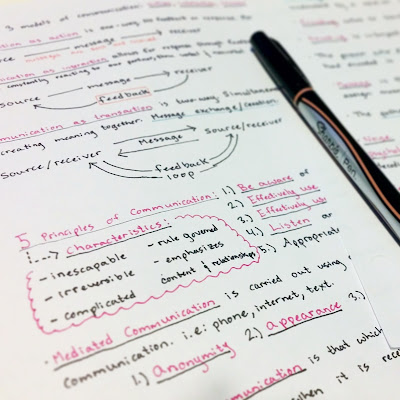Sorry for the lack of posts lately, I've had a lot of schoolwork, tests, and work-related stuff taking up most of my time.
This week was my spring break, which finally gave me a little extra time to just relax. It is also about half-way into the semester, which means it's time for midterms. Half of my midterms fell on the week before spring break, and the other half are the week after spring break.
Today I would like to share some tips on how to prepare for midterms. I follow these seven steps, written in the order that I do them, for every test. By doing this, I find that I am able to cover a lot of material in a short amount of time.
1.) Make a study plan
Time management is crucial. Write a list of all material that will be on the exam. Next, write down all the tasks you need to do in order to review the material. In this list, you should also include an estimated time to complete each task. Once you have done this for all your upcoming midterms, transfer the tasks into your day planner. Be sure to schedule the most important tasks first and include time for breaks, classes, and work.
2.) Read the chapter outline and chapter review
This helps jog your memory of the material you are reviewing. For each headline of the chapter outline, you should be able to explain its key concepts. A good way to do this is to turn the headline into a question and be able to provide an answer. If you can't answer the question, you should mark it as a section that you need to re-read.
3.) Do the chapter quizzes
If your textbook has end of chapter quizzes, make sure and do them. I use them to determine how well I know the material before I start studying. If I score low, I know I need to study the material more in-depth. In contrast, if I do well on the quiz, I will only lightly review the material.
4.) Read your lecture notes
If you
revise your notes on a regular basis, your notes should be well organized and this step won't take much time. If not, it will take more time to read and sift through all the information.
In my notes, I always put a star next to anything the professor said is important to remember or makes any hints that it will be on the test. When I review my notes, I focus on these concepts and write them onto a separate note card for quick reference.
5.) Go over in-class examples and old homework
Exam questions are often similar to homework questions and any examples done during lecture. Therefore, it is important to make sure you fully understand how to answer these questions.
6.) Write a study guide
This should be a condensed version of your notes that contains key concepts and terms. I also include any helpful diagrams or drawings.
7.) Use flashcards
Flashcards are especially useful for foreign language courses, classes with a lot of vocabulary you need to know, or for memorization of formulas. Don't forget to
keep them organized.
Lastly, don't panic!
While a small amount of stress can be good for keeping you motivated, stressing out too much can make it difficult for you to study, recall, and retain information. While you're studying, be sure to take short breaks, such as getting a cup of tea, a snack, or going for a quick run. If you are struggling with a specific concept, instead of getting frustrated, mark it for later and move onto the next concept.
If you get test anxiety, take a moment to clear your head before the test by writing down everything that worries you and then throw the paper away.
Good luck on your exams.









































 Welcome! Curiosity and Charm is a blog about my life as a student, fashion lover, and office supply enthusiast. Here you will find college study tips, outfits, home decor, and little pieces of my life.
Welcome! Curiosity and Charm is a blog about my life as a student, fashion lover, and office supply enthusiast. Here you will find college study tips, outfits, home decor, and little pieces of my life.



